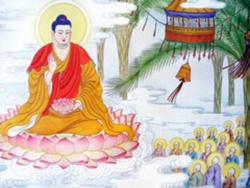Difference between revisions of "Four fearlessnesses"
Jump to navigation
Jump to search
m (Text replace - "thus" to "thus") |
m (Text replace - "1" to "1") |
||
| Line 8: | Line 8: | ||
The [[four fearlessnesses]] of a [[Buddha]] are | The [[four fearlessnesses]] of a [[Buddha]] are | ||
| − | :( | + | :(1) [[fearlessness]] in declaring oneself to be [[enlightened]] to the [[truth]] of all [[phenomena]], |
:(2) [[fearlessness]] in proclaiming oneself to have [[extinguished]] all [[desires]] and [[illusions]], | :(2) [[fearlessness]] in proclaiming oneself to have [[extinguished]] all [[desires]] and [[illusions]], | ||
:(3) [[fearlessness]] in proclaiming oneself to have elucidated the obstacles to [[Buddhist]] practice and [[enlightenment]], and | :(3) [[fearlessness]] in proclaiming oneself to have elucidated the obstacles to [[Buddhist]] practice and [[enlightenment]], and | ||
| Line 15: | Line 15: | ||
The [[four fearlessnesses]] of the [[bodhisattva]] are | The [[four fearlessnesses]] of the [[bodhisattva]] are | ||
| − | :( | + | :(1) [[fearlessness]] in continually memorizing the [[Buddhist teachings]], and in expounding the meaning of these teachings, |
:(2) [[fearlessness]] in perceiving the people's inherent capacities, and in expounding the teachings according to those capacities, | :(2) [[fearlessness]] in perceiving the people's inherent capacities, and in expounding the teachings according to those capacities, | ||
:(3) [[fearlessness]] in resolving the people's [[doubts]], and | :(3) [[fearlessness]] in resolving the people's [[doubts]], and | ||
Revision as of 15:59, 8 September 2013
(四無所畏・四無畏) (Jpn shi-mushoi or shi-mui )
Four types of confidence possessed by Buddhas and bodhisattvas. The four fearlessnesses of a Buddha are distinct from those of bodhisattvas.
The four fearlessnesses of a Buddha are
- (1) fearlessness in declaring oneself to be enlightened to the truth of all phenomena,
- (2) fearlessness in proclaiming oneself to have extinguished all desires and illusions,
- (3) fearlessness in proclaiming oneself to have elucidated the obstacles to Buddhist practice and enlightenment, and
- (4) fearlessness in declaring oneself to have clarified the way of liberation from the world of suffering, and thus the way of attaining emancipation.
The four fearlessnesses of the bodhisattva are
- (1) fearlessness in continually memorizing the Buddhist teachings, and in expounding the meaning of these teachings,
- (2) fearlessness in perceiving the people's inherent capacities, and in expounding the teachings according to those capacities,
- (3) fearlessness in resolving the people's doubts, and
- (4) fearlessness in answering any question.
The term fearlessness derives from the Sanskrit word vaisharadya, and here implies dauntless courage and unwavering confidence; it is regarded as one of the virtues of Buddhas and bodhisattvas.
